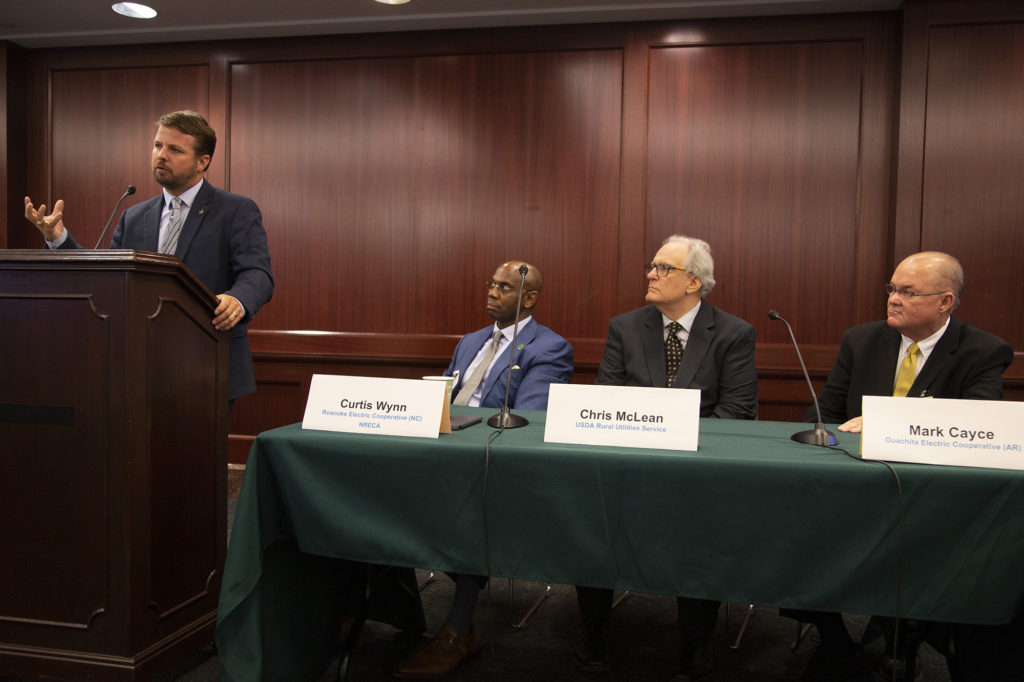
Helping electric cooperative members transform leaky, power-guzzling old houses into energy-efficient homes will slash electric bills and keep more money in the wallets of struggling rural Americans. But there’s also a good business reason to do it: Co-ops can save millions as they reduce the amount of wholesale energy they have to buy, NRECA President Curtis Wynn said at a Capitol Hill briefing Tuesday.
Wynn, CEO of Roanoke Electric Cooperative in Aulander, North Carolina, said his co-op uses a federal financing program to install insulation, water heater wraps and other improvements in members’ homes at an average cost of about $7,000. The co-op pays the upfront costs, and the member pays the co-op back over time through their monthly electric bills, which are lower overall as a result of the energy efficiency measures.
Roanoke would sell $2,762 less power over 20 years to a member who makes the improvements, Wynn said. But he said the co-op would save about $10,622 in electricity it no longer has to buy from power suppliers. The costs and savings from energy efficiency programs vary from co-op to co-op.
“We’re lowering the cost for every person who is a member of the co-op,” Wynn said, making what he called “a business case” for reducing costs for rural residents. The briefing, titled “Equitable Solutions to Rural Energy Burdens,” was sponsored by NRECA, the Environmental and Energy Study Institute and the National Cooperative Business Association.
Congress, in the Farm Bill passed last year, provided $100 million for fiscal 2019 for the U.S. Department of Agriculture’s Rural Energy Savings Program, which allows co-ops to provide no-interest or low-interest loans to their members to improve the energy efficiency of their homes. The co-ops repay the government as they are repaid by members.
“Thank you for making this nation’s greatness affordable and accessible for all our citizens,” Rep. Jim Clyburn, D-S.C., told co-op leaders. Clyburn is the third-ranking Democrat in the House and pushed for funding for the loan program.
Mark Cayce, general manager of Ouachita Electric Cooperative in Camden, Arkansas, said only one member out of 550 participants has defaulted on a loan. He said the program has given co-ops a solution for members who struggle to pay their electric bills but can’t afford the high upfront cost of making their homes more energy efficient.
“Members would tell us, ‘I don’t have the $300 to pay my bill, how am I going to come up with $7,000?’” Cayce said. “Now they don’t have to.”
Chad Lowder, CEO of Tri-County Electric Cooperative in St. Matthews, South Carolina, said he began his co-op career 19 years ago “crawling under homes to find out why someone’s power bill is so high.”
“What you learn quick…these members with the lowest income typically have the highest bill,” he said.
Lowder said he still remembers a single mother from 10 years ago who had a huge bill because she was heating her home with a stove after her heating unit broke. Today, South Carolina’s co-ops are using the federal loan program to help members save about 30% on their electric bills, Lowder said.
“They’re able to pay back their loans and still have excess money,” he said.
The reduced demand for electricity may prevent co-ops from having to build new generating stations, Lowder said. “It’s a win-win for the member and the co-op,” he said.
Erin Kelly is a staff writer at NRECA.